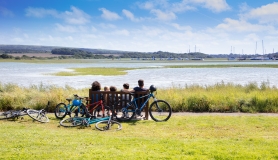Even if you aren’t a fan of the aquatic ape hypothesis, our affinity for water is deeply rooted in our primal brains. And, when you look at the benefits, it’s easy to see why.
Several NASA studies have shown that, after 12 weeks of regular swimming in cold/wild waters, the body quickly adapts (known, simply, as cold adaptation) and this has been shown to confer many health benefits from reducing the risk of heart attacks and strokes, to reducing the risk of cancer and even boosting fertility levels. Many who regularly swim in the sea, lakes, lochs and rivers have suggested a marked improvement in their overall immunity levels and their general mental wellbeing.
Even Charles Darwin was a fan. Under the care of Dr James Manby Gully, Darwin engaged in regular “cold water therapy” (cold water immersion) which he reported had cured him of many years of illness. The symptoms of his illness, which took him away from his work and which he had feared would kill him, disappeared along with his symptoms of depression. Darwin was later diagnosed with heart disease, yet lived to the age of 73.
Why, you might be wondering, would such a simple thing have such staggering benefits? The answer is fairly simple. When we strip away all of our modern conveniences, the closer we get to primal living - the healthier we become. Wild swimming is a small piece of the puzzle, but a significant piece nonetheless.
But, before you take the plunge, there are a few important considerations.
- Though Scotland is much less restricted, it is illegal to swim in some lakes and rivers in parts of the UK. It is important to check for restrictions before you plan to take a swim.
- In the UK, we are also fortunate to have the cleanest lakes, rivers and lochs for hundreds of years. However, it is important to steer clear of canals and shallow, slow moving waters that are likely to be stagnant. Avoid swimming in any body of water with visibles signs of floating algae. To be doubly sure, you can check on the cleanliness of your local water through The Environment Agency.
- Never swim beyond your depth and do not take children out of theirs without a secure buoyancy aid.
- Do not jump straight into cold waters, instead gradually ease yourself into them to minimise the risk of shock.
- Jelly shoes are recommended in rocky areas and wetsuits in colder weather.
So, even if you don’t have a beach holiday booked for this year you can still enjoy a spot of swimming and, perhaps, even make it a regular family activity to enjoy the many health benefits on offer.
For more information, and to find out about the best places to swim, check out:
www.outdoorswimmingsociety.com
READ about the mama who swam through her pregnancy for better mental and physical health in our recent issue




_278_160_c1.jpg)


